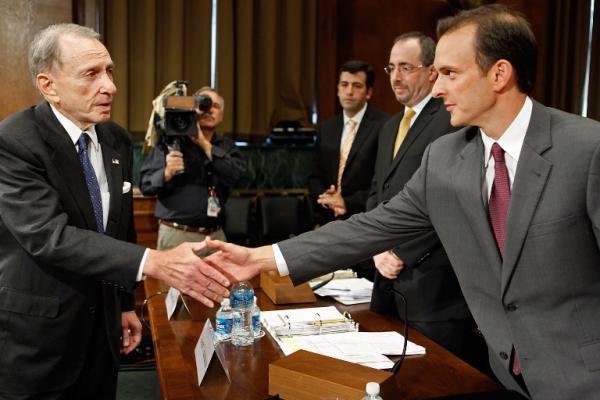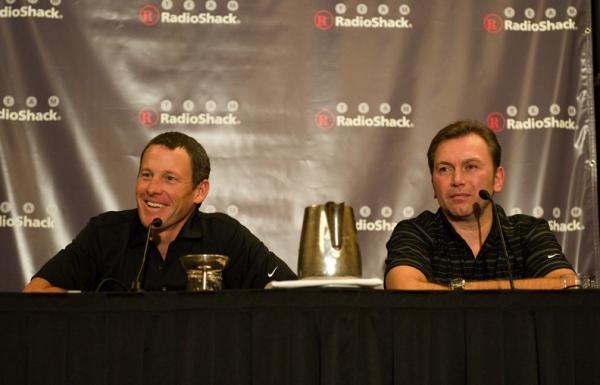Tygart: Armstrong's "essentially shut the door" on USADA cooperation
Kjærgaard describes descent into doping





US Anti-Doping Agency (USADA) CEO Travis Tygart has all but given uꦇp on gaining the cooperation of 🅷Lance Armstrong in his agency's "still ongoing investigation" of doping during the US Postal Service team years.
Tygart was ♔speaking at an anti-doping conference in Oslo, Norway,🐻 one week ahead of the scheduled arbitration of Johan Bruyneel's lifetime ban for involvement in the US Postal doping conspiracy.
He said that his agency "gave every athletﷺe, even Lance Armstrong, a chance to be a part of the solution, unfortunately he refused to do that, he continues today to refuse to do that. He's essentially shut the door on that opportunity.
"We've given him multiple opportunities over the l🏅ast 18 months, including a couple over the last couple of weeks. My sense i☂s that's not going to happen at least for now, and we're moving on with our investigation."
Tygart used broad strokes to describe the systemic doping that existed in cycling in the 1990s and 2000s, stating, "Athletes from almost every country that we've seen, at different teams, participated in a corrupt culture that took over the sport of cycling for a period of time, and it's why we've been pushing so hard for an independent process to get to the bottom of that culture and finally set the sport on a new p🌳ath, and to give athletes a genu♎ine choice."
USADA's arbitration hearing with Bruyneel and doctor Pedro Celaya and trainer Jose "Pepe" Marti is scheduled to take place in London next week, but the investigation could still encompass dozens of r﷽iders and associated staff who were named bu💎t redacted in the various published testimonies gathered in 2012.
Tygart emphasized that his agency was initially focused on making sure the 2012 Olympic team did not include dopers: Levi Leipheimer Christian Vande Velde, George Hincapie and David Zabriskie 168澳洲5最新开奖结果:refused their spots on the team before the details of the investigation were made public - and to ensure the culture of dღoping was dismantled.
The latest race content, interviews, features, revꦉiews and expert buying guides, direct to your inbox!
Toward that end, USADA successfully backed the campaign of Brian Cookson for UCI president, and Pat McQuaid, who 168澳💃洲5最新开奖结果:called Tyler Hamilton and Floyd Landis "scumbags" after their accusations against Armstro🧸ng, was drummed out of his position of powe🥀r.
"The head of the sport fel♌l," Tygart said. "Lack of leadership was ultimately why the president was not re-elected this year. The failure to fully protect clean athletes, and the failure to fulfill the promise to clean up the sport once and for all through ... an independent commission. There's new leadership in the sport - that was never our goal - but it sends a strong warning that clean athletes' rights are going to be protected, and if a leader can fall for not protecting those rights ... it sends a powerful message."
Kjærsgaard speaks out
In the same conference, former US Postal rider Steffen Kjærsgaard spoke out for the first time since his 168澳洲5最新开奖结果:October 23, 2012 conf♌ession to doping, describing his gradual path to cheating.
After avoiding the press f💛or the past year, the 40-year-old Norwegian took to the stage after the impassioned speec🧜h by Tygart, and added his story to that of the other riders of the US Postal Service team who have admitted to doping.
For Kjærsgaard, the decision to give in to doping came slowly, and he echoed the sentiments of others such as David Zabriskie, Tyler Hamilton, George Hincapie, Christian♋ Vande Velde, Michael Barry 🔥and Tom Danielson, that the culture of doping in the sport at the time made it impossible to compete clean.
"When I took the choice to begin doping, there were no consequences to doping yourself. When I started my first EPO course in May 1998, the fear of being caught was absent and it felt completely safe," he said, according to Dagbladet.
"Most [riders] were opposed to doping," he continued. "Those who were a few years olderജ than me were opposed to doping like me, but they had resigned to the culture that dominated the peloton."
Kjærgaard made his decision after attempting to race clean with TVM in 1997, and being unable to hang in t🔜he races. "I decided to pack up and go home. But in 1997 I got a call from Kim Andersen, who asked if I would be part of a small ❀Danish team. My immediate feeling was no, but I had come this far and I was so close to the target, but still so far away."
Two weeks later, when Andersen called, he said yes, and joined Chicky World. By the spring of 1998 he had started with EPO, cortisone and other drugs. "It came naturally," he said. He rode two season𝔉s with the Danish tea🀅m before moving on to US Postal Service in 2000, where he stayed for four seasons.
Kjærgaard gave no excuses for his behavior or his choices. "This is more of an explanation of the choices I made, rather than a rationalization. I'm still sorry on behalf of𝐆 Norwegian sport, but mostly because of the family: wife, mom and my dad," he said.
